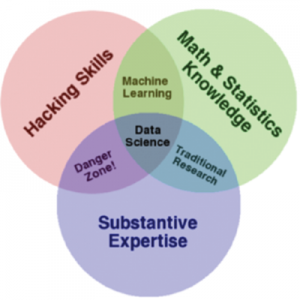
James Chenyang Wang is a data storyteller at Duke and an incoming product analyst at Thumbtack. He loves slide tacklings in soccer.
Congratulations, you just made a choice that will bring you a fancy-sounding career! Predicting elections, forecasting business growth, identifying people in risk of cancer… a future of working on these types of projects is motivating.
As a Duke senior who has had a long journey studying data science and is going to a tech company in San Francisco after graduation, I want to share with you—aspiring freshmen, sophomore, and junior data science students—some insights I wish I’d had earlier. Imagine we are grabbing coffee and you ask me, “What should I do to be a data science (DS) wiz after undergraduate school?” Here are the three points I would make to you:
A data science candidate needs to have a combination of skills, but you don’t need to be the master of everything.
It ranges from data wrangling and statistics to business sense to interpersonal skills. It’s hard because we need to be more well-rounded and proactive in learning certain skills not taught in our undergraduate courses. It’s easy because it’s so fun and so powerful when we learn these skills.
Drew Conway invented a DS Venn diagram that indicates the section where DS lies (Figure 1).
From my experience, we can view a new graduate DS job as that of a consultant who solves problems by coding up data analytics. We don’t need to be as strong of a coder as a software engineer or as talkative as a management consultant. But some coding skills plus business/product sense, in addition to a great understanding of statistics, will make us excel in DS.
You don’t need to have a DS title to do data science.
“Data scientist” (DS) sounds fancy, while “data analyst” (DA) sounds cheap, so a DS is definitely better than a DA, right? No.
The whole DS industry is so young, and the term “data science” is not well defined. In one company, a DS could be a PhD with five years of working experience building production-level model pipeline for fraud detection. In another company, a DS could be a new graduate doing charts in Excel.
By the same logic, when you job search, do not only look for jobs with the title “data scientist.” Sometimes, the fancy jobs that harness the skills of machine learning, data wrangling, and business recommendation have titles such as “data analyst,” “product analyst,” or “business analyst,” while data scientists are those with advanced degrees and industry experience.
In my case, I turned down a DS position from Company A and signed on as a product analyst with Company B because a product analyst at Company B was the more intellectually challenging position.
So, don’t just look at the title. Make sure you read the job description and talk to people inside to learn what it is like to work at a particular place.
Breaking into Startups: Tech News
Axios Newsletters
The Hustle
Recode
The Wall Street Journal
Visit James Wang’s blog to view more recommendations, including what courses to take and apps to download, and tips for learning SQL
What should I do to prepare for becoming a DS after college?
You should take more applied classes in statistics and computer science (electives and graduate-level courses). As a stats major at Duke, I found that while the undergraduate statistics core classes laid out a strong foundation for statistical theories, it was the electives and graduate-level courses that actually helped me in interviews and carrying out projects in a company. I recommend taking classes that teach you how to code in R / Python for statistical computing and classes that teach you how to build models and do machine learning. In interviews, you will be tested on your data wrangling skills and statistical modeling knowledge, but rarely on deriving gamma distributions.
You should develop your business/product sense. Doing DS (and not software) means you will not be coding 100% of the time. It is a job that also involves strategy, problem solving, and presentation. Since sophomore summer, I’ve been taking business classes, subscribing to business/tech email newsletters, and listening to business podcasts. The days before I flew to interviews, I spent hours reading up on those employers; testing their products; and thinking about their competitive advantage, revenue streams, and business logic. These product/business insights not only enabled me to ask smart questions during interviews, but also carried me through the case/product interview sessions.
You should build relationships with alums. One of the biggest disadvantages for aspiring Duke data science students is that those companies don’t come to Duke to recruit. So, while our software or consulting friends were talking to recruiters at career fairs, my DS friends and I found ourselves with nowhere to go.
Taking advice from Howie Rhee (Duke mentor), I cold emailed, called, and flew out to the Bay Area to build relationships with Duke alums working in the DS industry. Connecting over lunch, coffee, or drinks, I learned so much about the industry, life in the Bay Area, and the recruiting process from those good people (which is also why I feel the urge to give back). I eventually landed a few interviews through those internal referrals, and it was those opportunities I converted into offers.




Thanks for sharing this great information